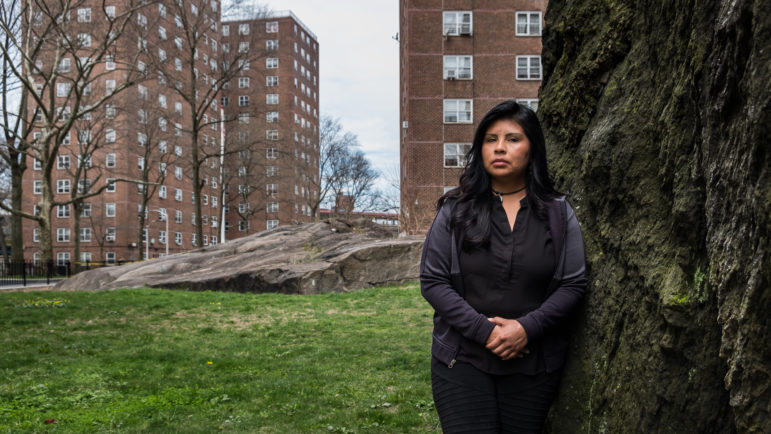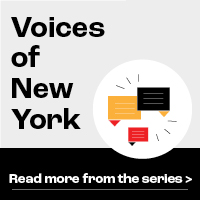
Adi Talwar
Magda Aguirre on a recent afternoon in the Bronx. She knows several undocumented residents who are experiencing symptoms, and says immigrant communities are being hit hard by the pandemic.While all New Yorkers are under threat from the COVID-19 pandemic, undocumented residents – many of them essential and front-line workers – are especially vulnerable in the crisis, advocates say. Still facing the threat of immigration enforcement, they’re also ineligible for most coronavirus government relief benefits, leaving many feeling deserted by the communities they’ve lived and worked in for years.
“Why can’t we get help as Americans, if we’ve paid our taxes like everybody else? Why is our contribution to society not acknowledged if we have been law-abiding residents for more than 20 years and have children that were born as American citizens?” says Rosalba, an undocumented immigrant from Tehuacán in Puebla, Mexico.
Rosalba (her last name is being withheld for her safety) has symptoms of COVID-19, but taking a break is not an option. Her husband contracted what appeared to be coronavirus more than two weeks ago – he has fever and aches so intense he’s unable to stand on his feet. Rosalba cares for him and their two children.
She frets over how the family will pay their monthly bills after losing all of their income since the pandemic was declared. Her husband worked as a cook, and she sold Mexican crafts in street fairs – now forbidden. The delivery worker to whom the family rents a room is also bedridden with COVID-19 symptoms.
Assisting the undocumented community during the pandemic is not just a moral or humanitarian duty; it is a necessary step to thoroughly curb the contagion spread in New York, advocates say.
“If the undocumented immigrants are not safe, nobody is going to be safe in New York,” says Lorena Kourousias, director of Mixteca Organization, a nonprofit in Sunset Park, Brooklyn.
No help from Congress
In spite of this, undocumented workers won’t benefit from the Congress-approved $2 trillion stimulus package to help business owners, and those with social security numbers, make ends meet in the pandemic. Even couples where one spouse is documented and the other is not are ineligible for assistance.
“There are whole families that already have the coronavirus,” says Kourousias.
Without help from the government, community-based organizations are trying to fill that gap. Mixteca Organization is providing prepaid $250 debit cards to 100 families in distress in the immigrant community of Sunset Park.
While the city is offering food assistance to all residents in need – the mayor’s office has stressed that “no one will be turned away” from the so-called Meal Hubs, where people can pick up three meals a day – some undocumented residents are wary of receiving help from the local government, fearful it could risk revealing their immigration status. The Mexican Coalition, a small nonprofit located within a church in the South Bronx, is dispensing staples such as rice and beans. Other nonprofits, like the New Sanctuary Coalition in Brooklyn and the Mercy Center in the Bronx, also provide meals for undocumented families. While the city has opened Food assistance is available to all New York residents.
In addition to food, there are other necessities to be covered. “Lots of immigrants are asking for help to pay their phone bills, their basic lifelines for emergencies and for connecting with relatives in their countries of origin,” says Jairo Guzmán, director of the Mexican Coalition.
A survey of 160 people conducted last week by the nonprofit found that 66 percent of respondents do not have money to purchase necessities for themselves or their family for a period of 14 days; 78 percent reported that they don’t have enough money to make their monthly payments.
“What surprised me the most about the survey is that 82 percent of respondents did not know of any other organization that could help them, besides the Mexican Coalition. That shows how disenfranchised our immigrant community is,” says Guzmán. More than half of respondents said they don’t believe their local government will be able to help them.
That lack of support has left immigrants like Rosalba desperate and disillusioned.
“My husband stopped working because he had a high fever. The next day, the owner of the restaurant called and asked him to come back to work. My husband said he was sick and they stopped calling him. He has worked in that same restaurant for 25 years and they just forgot about him,” says Rosalba.
According to the mayor’s office, 560,000 undocumented immigrants reside in the city. They staff New York’s kitchens, bodegas and delivery services. While keeping the city running, the undocumented workers allow millions of New Yorkers to shelter-in-place: A report from the city comptroller’s office last month found that more than 50 percent of New York’s front-line workers are foreign born, including 19 percent who are non-citizens.
The city’s Latino population in particular has been more severely affected by the pandemic than any other ethnic group. The preliminary death rate for Latino residents is about 22 people per 100,000, which is double the rate for White residents, according to preliminary figures released on Wednesday by the mayor’s office. In comparison, the rate for Blacks is 20 people per 100,000 and eight people per 100,000 in the city’s Asian populations.
Many undocumented immigrants will work until they cannot get out of bed anymore or even worse, from their perspective, until their employers force them to stay home – without compensation.
“One could always ask for a loan from a neighbor because we support each other within the community, but now everybody is in the same situation. Nobody has cash,” says Rosalba.
She would like her husband and other undocumented workers to receive unemployment benefits while sick. She would also like the government to freeze her rent payments for some months.
As state or city lawmakers consider potential rent relief programs, they also need to recognize that many immigrant workers are room-renters, not apartment renters, says Guzmán. Thus any help with rent will require a strategy that reaches the room-renter who will likely be forced to pay the usual monthly rent to the legal leaseholder. The same applies to any help with utility bills, according to Guzmán.
Intersectional pressure
Undocumented workers are not only absent in the economic package and the stimulus programs that the federal and state governments are rolling out; they also face the constant threat of detention by Immigration and Customs Enforcement (ICE) officers.
“Our immigrant communities are being attacked on many different fronts. Not only are they at an increased risk of COVID-19 exposure due to the nature of what is often customer-facing work or factory work in congregate settings, but they also face increased stress and anxiety due to intersectional pressures,” says Mon Yuck Yu of the Academy of Medical & Public Health Services.
Following outcry from activists and health experts, ICE declared on March 18 that it would suspend enforcement operations at or near healthcare facilities, “except in the most extraordinary of circumstances.”
The announcement did little to assuage immigrants’ fears, especially as enforcement operations continued in California and New York, according to a letter sent by the American Civil Liberties Union (ACLU) to the Department of Homeland Security (DHS) and ICE on April 3. “Immigrants must not be afraid to seek medical testing and care,” the letter warned.
The undocumented community is not only afraid to seek medical care but to venture out of their homes to buy food and medicine, according to the ACLU.
“Many undocumented immigrants only call an ambulance when they realize they won’t be able to survive, as a way of sparing the family of the tragedy of their deaths and the burden of their remains,” says Magda Aguirre, an activist and community health graduate from Hostos Community College.
An immigrant from San Pedro Aytec in Guerrero, Mexico, Aguirre has lived in New York since 1999, after she escaped extreme violence in Mexico and was granted a U visa, given to survivors of crimes who have suffered severe physical or mental abuse. While she has COVID-19 symptoms herself, she feels lucky compared to others she knows, including family members who are undocumented and have also fallen ill.
“Most undocumented immigrants lack insurance and a first care physician, so usually their only option is the emergency room. But they are terrified of being detained by ICE agents or have their information shared with federal officials by the hospital staff, if they do go there,” says Aguirre.
New York State health officials announced recently that undocumented immigrants would be tested and treated without cost if they contracted the coronavirus. But fear still runs deep in the community.
To those willing to risk detention, tests are not readily available, anyway. Neither Aguirre nor her son, who also showed COVID-19 symptoms, were able to get tested at Montefiore hospital in the Bronx.
As a consequence, it’s likely the pandemic’s death toll is higher than official figures suggest, as it does not account for all of the undocumented immigrants, and others, who have died with COVID-19 symptoms in their homes. City officials announced just Wednesday that it would begin counting suspected but not confirmed coronavirus cases in its fatality counts.
The COVID-19 crisis has shown the urgent need to acknowledge that undocumented workers are crucial for the well-being of the city, and the nation, advocates say. This paradoxical condition – of being both socially invisible but indispensable – is evident in the case of farmworkers in California, who are still vulnerable to deportation despite their work being deemed “essential” by DHS, according to the New York Times.
“I would like to think that this is an opportunity to redefine the fundamental role of undocumented immigrants in our society, but previous crises don’t leave much room for optimism,” says Kourousias. “After the pandemic is over, many people will forget about immigrants again.”











One thought on “City’s Undocumented Latinos, Many on the Front Lines, Feel Abandoned Amid Pandemic”
I wish to donate. Can I send a postal money order or a bank check? If yes, made out
to whom?